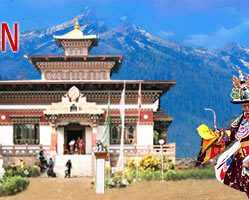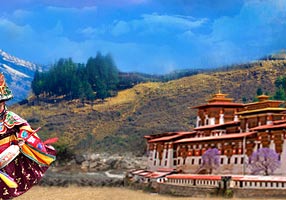1907 was an important year in the history of Bhutan. Leading Buddhist monks, government officials and heads of important families chose Ugyen Wangchuck as their hereditary king unanimously. British government was the first to give recognition to the new monarchy. Three years later, in 1910, Bhutan signed a treaty with Great Britain to let it ‘guide’ Bhutan's foreign affairs. After India got its independence on August 15, 1947, Bhutan was the first one to recognize India's independence and on August 8, 1949, Bhutan signed a new treaty with the newly independent India that was similar to the one they had with British when they occupied the region. In 1951, the Chinese People's Liberation Army entered Tibet and the fear of Chinese encroachment, led Bhutan to seal its northern frontier and improve bilateral ties with India.
India also sponsored Bhutan’s modernization program under King Jigme Dorji Wangchuck. In 1953, the country's legislature with 130-member National Assembly was set up, in order to promote a more democratic form of governance in Bhutan. In 1965, King Dorji set up Royal Advisory Council and the Cabinet came into being in 1968. Since then, Bhutan gained an observer status in the United Nations. Finally, in 1971, it was admitted to the United Nations. King Dorji died in July 1972 and his 16-year old son Jigme Singye Wangchuck ascended the throne. Bhutan has an ongoing problem of illegal immigration by the people of Nepalese descent, ever since the 19th century. In 1958, these immigrants were 'naturalized by registration’ by the 1958 Citizenship Act but the problem increased even more after that until the government took strict steps to evacuate them in 1980s.
The present king, King Jigme Singye Wangchuck, introduced some notable political reforms in 1998. He transferred most of his powers to the Prime Minister and made way to allow impeachment of the King by the National Assembly by two-thirds majority. In 1999, he also lifted a ban on television and Internet that had been perceived as a threat to Bhutan’s culture and traditional values. Thus, Bhutan was one of the last countries to allow television. The King said that it had become necessary for modernization of Bhutan and increase Bhutan’s Gross National Happiness (GNH). Bhutan is the only country to calculate GNH. He also warned the misuse of television. The Bhutanese army successfully crushed all large-scale anti-India training camps that had sprung up in southern Bhutan in late 2003. In early 2005, a new constitution has been presented and in December that year, King Jigme Singye Wangchuck announced that he would step down as King of Bhutan in 2008 and will be succeeded by his son, the crown prince Jigme Khesar Namgyel Wangchuck.




